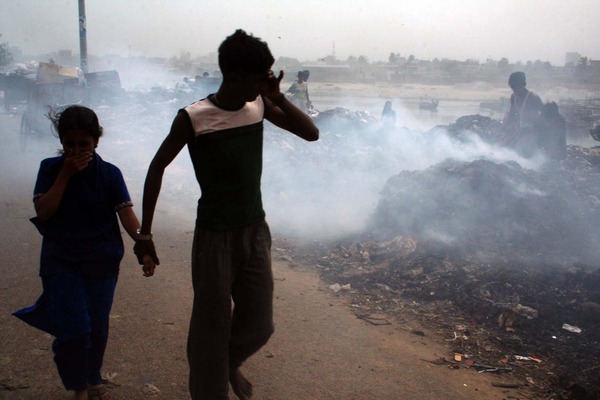Statement by UNICEF Executive Director on toxic air in South Asia

DUBLIN/NEW YORK 06 November 2019 – “I was just in South Asia where I saw first-hand how children continue to suffer from the dire consequences of air pollution.
“The air quality was at a crisis level. You could smell the toxic fog even from behind an air filtration mask. From every neighbourhood, you could see the pollution obscuring buildings, trees and people. Schools and offices closed or curtailed hours. With winter approaching, the situation is set to become even worse.
“Around 620 million children in the region breathe polluted, toxic air. Because they have smaller lungs, breathe twice as fast as adults, and lack the immunities that come with age, children endure its damaging health and neurological effects the most.
“Air pollution is associated with one of the biggest killers of children – pneumonia, and linked to asthma, bronchitis, and other respiratory infections. Air pollution damages brain tissue and undermines cognitive development in babies and young children, leading to lifelong consequences that can affect their learning outcomes and future potential. There is evidence to suggest that adolescents exposed to higher levels of air pollution are more likely to experience mental health problems.
“The toxicity to children’s brain development and health is also toxic to society, which no government can afford to ignore. The ripple effects extend far and wide. When children are sick, they frequently miss school. In extreme cases, when the air is so toxic, schools may close, as we have seen in Delhi just this week. Pollution levels were literally above the range that sensors could measure, many times above what can reasonably be considered safe for children and clearly presenting grave risks to their health and development.”
Health expenses may increase if children need care and treatment. Parents may need to stay home too, in order to care for their children. Potential income is lost, and quality of life is reduced. The effects of air pollution on children can be felt well into adulthood.
“UNICEF is calling for urgent action to address this air quality crisis. Governments in the region and around the world should take urgent steps to reduce air pollution by investing in cleaner, renewable sources of energy to replace fossil fuel combustion; provide affordable access to clean public transport; increase green spaces in urban areas; change agricultural practices and provide better waste management options to prevent open burning of harmful chemicals.
“Children have a right to live in a clean environment and to breathe clean air. We must act now.
ENDS
###
Notes for editors:
About UNICEF
UNICEF works in the world’s toughest places, to reach the world’s most disadvantaged children. Across more than 190 countries and territories, we work for every child, everywhere, to build a better world for everyone.
For more information about UNICEF and its work, visit our website.
Follow us on Twitter and Facebook
For more information, please contact:
Aedín Donnelly, Communications and Media Manager for UNICEF Ireland | aedin@unicef.ie | Tel: +353 1 809 0266 | Mob: +353 85 1395272
Georgina Thompson, UNICEF Headquarters | gthompson@unicef.org | +19172654524
Anne Sophie Bonefeld, UNICEF ROSA | abonefeld@unicef.org | +977-9801030076




